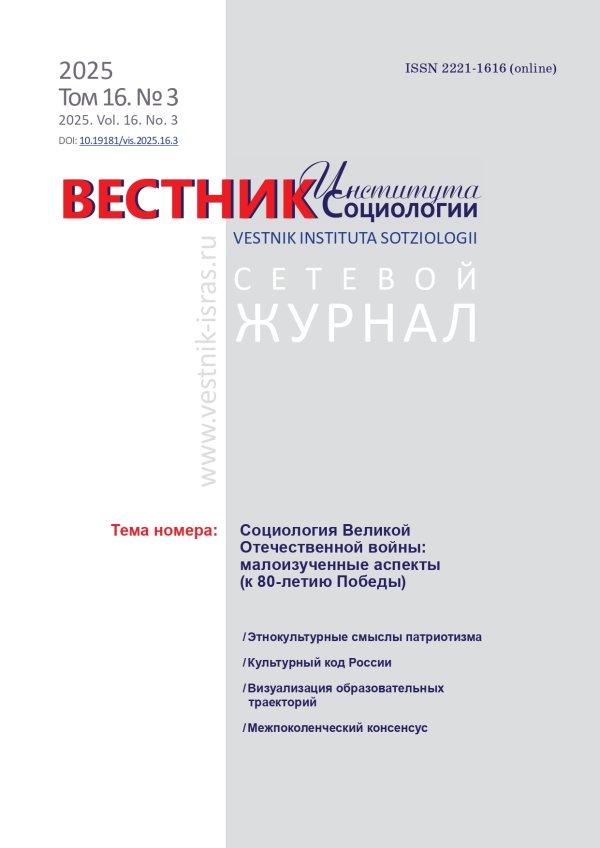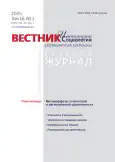Доверие как фактор корпоративной солидарности на промышленных предприятиях России
- Авторы: Германов И.А.1, Кузнецов А.Е.1
-
Учреждения:
- Пермский государственный национальный исследовательский университет
- Выпуск: Том 16, № 1 (2025)
- Страницы: 90-112
- Раздел: Социология управления
- URL: https://journal-vniispk.ru/2221-1616/article/view/289106
- DOI: https://doi.org/10.19181/vis.2025.16.1.6
- EDN: https://elibrary.ru/PHRJPK
- ID: 289106
Цитировать
Полный текст
Аннотация
Авторами предложена типология определений доверия, а также концептуализация доверия в сфере трудовых отношений, позволившая интерпретировать уровень доверия на обследованных предприятиях как относительно высокий. Понимание доверия в научной литературе имеет тенденцию к психологизации этого концепта – редуцировать его к психологической установке. Учет статусных и темпоральных аспектов трудовых отношений позволяет, по нашему мнению, ресоциологизировать концепт «доверие». Доверие в сфере производства следует понимать как реципрокное и основанное на институциональном действии. В качестве меры стимулирования доверия между менеджментом и работниками предложено учесть опыт рабочих директоров в зарубежной практике в качестве канала информирования работников о финансово-экономическом положении предприятия и института легитимации решений руководства. Исторически этот институт ассоциировался с участием работников в управлении, что, скорее, дискредитировало его возможности в глазах обеих сторон, поскольку представлялся эфемерным одной стороне и посягательством на прерогативы менеджмента – другой.
Авторы приходят к выводу, что перспективы развития корпоративной солидарности на отечественных предприятиях зависят главным образом от вектора развития организационной среды и трудовых отношений.
Об авторах
Игорь Анатольевич Германов
Пермский государственный национальный исследовательский университет
Email: gian@psu.ru
ORCID iD: 0000-0002-2338-6693
SPIN-код: 3463-6521
Кандидат социологических наук, доцент, ректор, доцент кафедры социологии Пермь, Россия
Александр Евгеньевич Кузнецов
Пермский государственный национальный исследовательский университет
Email: kzntsv@list.ru
ORCID iD: 0000-0003-1699-6466
SPIN-код: 6325-0018
Кандидат социологических наук, доцент кафедры социологии Пермь, Россия
Список литературы
- Бессокирная Г. П., Татарова Г. Г. Идентификация с предприятием: концептуальная модель и инструментарий исследования [Электронный ресурс] // Официальный сайт ИС РАН. URL:http://www.isras.ru/publ.html?id=2768 (дата обращения 23.03.2021).
- Воронин Г. Л., Козырева П. М., Косолапов М. С. и др. Социально-экономическое поведение российских домохозяйств в 1994–2020 гг. // Вестник РМЭПЗН НИУ ВШЭ (RLMS – HSE). Вып. 12. [Электронный ресурс]: сб. науч. ст. / Отв. ред. П.М. Козырева. М.: Нац. исслед. ун-т «Высшая школа экономики», 2022. URL: https://www.hse.ru/rlms/vestnik#vestnik12 (дата обращения: 30.10.2022). EDN: KVGNWX.
- Климова С. Персонификация или солидарность // Отечественные записки. 2003. № 3. URL: https://strana-oz.ru/2003/3/personifikaciya-ili-solidarnost (дата обращения: 25.03.2022).
- Козырева П. М. Доверие и его ресурсы в современной России. М.: ИС РАН, 2011. 172 с. EDN: PVCPIX.
- Меньшикова О. И. Уровень благосостояния трудоспособного населения как концентрированное выражение качества трудовой жизни // Мир Новой экономики. 2020. № 3. С. 15–26. doi: 10.26794/2220-6469-2020-14-3-15-26; EDN: VWXJCQ.
- Наемный работник в современной России / Отв. ред. З. Т. Голенкова. М.: Новый хронограф, 2015. 368 с.
- Профсоюзное пространство современной России / Под ред. В. Борисова, С. Кларка. М.: ИСИТО, 2001. 331 с. EDN: ZRJSFZ.
- Российский рынок труда: тенденции, институты, структурные изменения / Ред. В. Е. Гимпельсон, Р. И. Капелюшников, С. Ю. Рощин. М.: ЦСР, 2017. 148 с.
- Солидаризация в рабочей среде: социальное и индивидуальное / Ред. В. А. Ядов. М.: ИС РАН, 1998. 231 с.
- Темницкий А. Л. Предпосылки выращивания институтов партнерства в сфере трудовых отношений: концептуальные модели и эмпирическая проверка // Модернизация экономики и выращивание институтов в 2-х кн. Кн. 2. / Отв. ред. Е. Г. Ясин. М.: ГУ ВШЭ, 2005. С. 104–116. EDN: VFKOYP.
- Тощенко Ж. Т. Прекариат: от протокласса к новому классу. М.: Наука, 2018. 350 с. EDN: VKRCMM.
- Трудовые права: кто на страже? https://wciom.ru/analytical-reviews/analiticheskii-obzor/trudovye-prava-kto-na-strazhe (дата обращения: 25.03.2022).
- Baier A. Trust and antitrust // Ethics. 1986. Vol. 96. No. 2. P. 231–260. doi: 10.1086/292745.
- Bales R. F. Interaction Process Analysis: A Method for the Study of Small Groups. Cambridge, MA: Addison-Wesley, 1950. 234 p.
- Barber B. The Logic and Limits of Trust. New Brunswick: Rutgers University Press, 1983. 190 p.
- Blau P. M. Exchange and Power in Social Life. N. Y.: Wiley, 1964. 352 p.
- Bigley G. A., Pearce J. L. Straining for shared meaning in organization science: Problems of trust and distrust // The Academy of Management Review. 1998. Vol. 23. No. 3. P. 405–421. doi: 10.2307/259286.
- Coleman J. S. Foundations of social theory. Cambridge, MA: Belknap Press of Harvard University, 1990. 993 p.
- Cook J., Wall T. New work attitude measures of trust, organizational commitment and personal need non-fulfilment // Journal of Occupational Psychology. 1980. Vol. 53. P. 39–52. doi: 10.1111/j.2044-8325.1980.tb00005.x.
- Costa A. C., Anderson N. Measuring trust in teams: Development and validation of a multifaceted measure of formative and reflective indicators of team trust // European Journal of Work and Organizational Psychology. 2011. Vol. 20. No. 1. P. 119–154. doi: 10.1080/13594320903272083.
- Cropanzano R., Mitchell M. S. Social exchange theory: An interdisciplinary review // Journal of Management. 2005. Vol. 31. No. 6. P. 874–900. doi: 10.1177/0149206305279602.
- Deutsch M. The resolution of conflict, constructive and destructive processes. New Haven: Yale University Press, 1973. 420 p.
- Dietz G., Den Hartog D. Measuring trust inside organizations // Personnel Review. 2006. Vol. 35. No. 5. P. 557–588. doi: 10.1108/00483480610682299.
- Dirks K. T., Ferrin D. L. The role of trust in organizational settings // Organization Science. 2001. Vol. 12. No. 4. P. 450–467. doi: 10.1287/ORSC.12.4.450.10640.
- Dirks K. T., de Jong B. Trust within the workplace: A review of two waves of research and a glimpse of the third // Annual Review of Organizational Psychology and Organizational Behavior. 2022. Vol. 9. P. 247–276. doi: 10.1146/annurev-orgpsych-012420-083025.
- Dutton J. E., Dukerich J. M., Harquai C. V. Organizational images and member identification // Administrative Science Quarterly. 1994. Vol. 39. P. 239–263. doi: 10.2307/2393235.
- Gambetta D. Can we trust trust? // Gambetta D. (ed) Trust: Making and Breaking Cooperative Relations. Oxford: Basil Blackwell, 1988. P. 213–237.
- Giddens A. Modernity and Self-Identity: Self and Society in a Late Modern Age. Stanford: Stanford University Press, 1991. 264 p.
- Hardin R. Trust and Trustworthiness. N. Y.: Russell Sage Foundation, 2002. 234 p.
- Kramer R. M. Trust and distrust in organizations: emerging perspectives, enduring questions // Annual review of psychology. 1999. Vol. 50. P. 569–98. doi: 10.1146/ANNUREV.PSYCH.50.1.569.
- Kramer R. M. Collective Trust within Organizations: Conceptual Foundations and Empirical Insights // Corporate Reputation Review. 2010. Vol. 13. P. 82–97. doi: 10.1057/CRR.2010.9.
- Legood A., van der Werff L. et al. A critical review of the conceptualization, operationalization, and empirical literature on cognition‐based and affect‐based trust // Journal of Management Studies. 2023. Vol. 60. No. 2. P. 495–537. doi: 10.1111/joms.12811.
- Lewicki R. J., Bunker B. B. Trust in relationships: A model of development and decline // Bunker B. B., Rubin J. Z. (eds) Conflict, cooperation, and justice: Essays inspired by the work of Morton Deutsch. San Francisco, CA: Jossey-Bass/Wiley, 1995. P. 133–173.
- Lewicki R. J., Tomlinson E. C., Gillespie N. M. Models of Interpersonal Trust Development: Theoretical Approaches, Empirical Evidence, and Future Directions // Journal of Management. 2006. Vol. 32. No. 6. P. 991–1022. doi: 10.1177/0149206306294405.
- Lewis J. D., Weigert A. Trust as a social reality // Social Forces. 1985. Vol. 63. No. 4. P. 967–985. doi: 10.1093/sf/63.4.967.
- Luhmann N. Trust and Power. Two works by Niklas Luhmann. Chichester: John Wiley & Sons, 1982. 208 p.
- Mayer R. C., Davis J. H., Schoorman F. D. An integrative model of organizational trust // The Academy of Management Review. 1995. Vol. 20. No. 3. P. 709–734. doi: 10.2307/258792.
- McAllister D. J. Affect- and cognition-based trust as foundations for interpersonal cooperation in organizations // Academy of Management Journal. 1995. Vol. 38. No. 1. P. 24–59. doi: 10.5465/256727.
- Möllering G. The nature of trust: From Georg Simmel to a theory of expectation, interpretation and suspension // Sociology. 2001. Vol. 35. No. 2. P. 403–20. doi: 10.1177/S0038038501000190.
- Möllering G. The trust/control duality // International Sociology. 2005. Vol. 20. No. 3. P. 283–305. doi: 10.1177/0268580905055478.
- Möllering G. The practical wisdom of trust: An interview with Bart Nooteboom // Journal of Trust Research. 2015. Vol. 5. No. 2. P. 170–183. doi: 10.1080/21515581.2015.1070731.
- Parsons T. Research with human subjects and the "professional complex" // Daedalus. 1969. Vol. 98. No. 2. P. 325–360. doi: 10.2307/20023881.
- Rousseau D. M., Sitkin S. B. et al. Not so different after all: A cross-discipline view of trust // Academy of Management Review. 1998. Vol. 23. P. 393–404. doi: 10.5465/AMR.1998.926617.
- Schoorman F. D., Mayer R. C., Davis J. H. An integrative model of organizational trust: Past, present, and future // The Academy of Management Review. 2007. Vol. 32. № 2. P. 344–354. doi: 10.2307/20159304.
- Simmel G. The philosophy of money. 3rd ed. D. Frisby (ed.). Transl. by T. Bottomore, D. Frisby. L.-N. Y.: Routledge, 2004. 616 p.
- Sitkin S. B., Roth N. L. Explaining the Limited effectiveness of Legalistic “Remedies” for Trust/Distrust // Organization Science. 1993. Vol. 4. No. 3. P. 367–392. doi: 10.1287/orsc.4.3.367.
- Six F. E. Building interpersonal trust within organizations: a relational signalling perspective // Journal of Management and Governance. 2007. Vol. 11. P. 285–309. doi: 10.1007/S10997-007-9030-9.
- Sztompka P. Trust: A Sociological Theory. Cambridge, MA: Cambridge University Press, 1999. 214 p.
- Zand D. Trust and managerial problem solving // Administrative Science Quarterly. 1972. Vol. 17. No. 2. P. 229–239. doi: 10.2307/2393957.
- Zhang S., Liu Z. A meta-analysis of the relationship between organizational identification and turnover intention // Acta Psychologica Sinica. 2016. Vol. 48. P. 1561–1573. doi: 10.3724/SP.J.1041.2016.01561.
Дополнительные файлы











